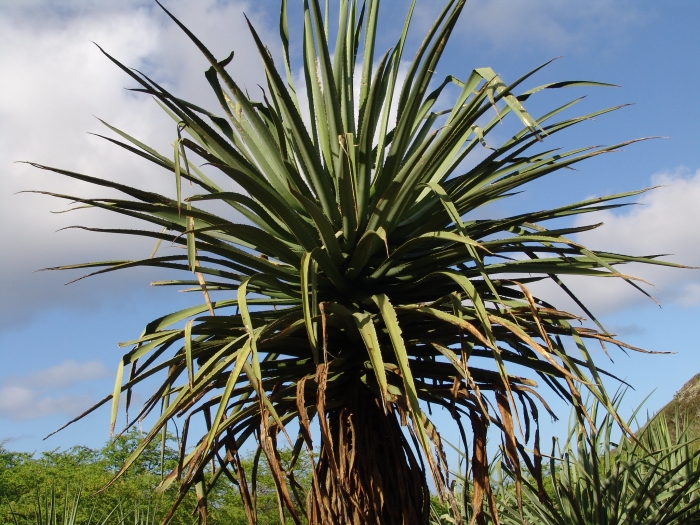Macdougal’s Giant Century Plant
(Furcraea macdougalii)
Macdougal’s Giant Century Plant (Furcraea macdougalii)
/
/

Drew Avery
CC BY 2.0
Image By:
Drew Avery
Recorded By:
Copyright:
CC BY 2.0
Copyright Notice:
Photo by: Drew Avery | License Type: CC BY 2.0 | License URL: https://creativecommons.org/licenses/by/2.0/ | Uploader: Drew Avery | Publisher: Flickr |















Estimated Native Range
Summary
Furcraea macdougalii, commonly known as Macdougal’s Giant Century Plant, is an evergreen succulent native to the rocky slopes and arid regions of Southwestern Mexico. It can reach impressive heights and widths of 15-24 feet (5-7 meters), resembling a large tree-like form with a thick central stem and long, strap-shaped leaves. The leaves are a striking blue-green color and can be quite imposing due to their size. During its rare flowering event, which can take years, it produces a tall flower spike with clusters of creamy white flowers, which are particularly showy and attract pollinators such as bats and moths.
Macdougal’s Giant Century Plant is valued for its dramatic architectural form and is often used as a focal point in xeriscapes, rock gardens, and large container plantings. It is well-suited to dry, desert-like gardens and is remarkably low maintenance, requiring minimal water once established. This plant thrives in full sun and prefers well-draining soil, making it an excellent choice for gardeners looking to conserve water. While it is generally disease-free, it can be susceptible to root rot if overwatered. After flowering, the main plant typically dies, but it often produces offsets or "pups" that can be replanted. It is important to note that the leaves are edged with sharp spines, which can be a hazard if not handled carefully.CC BY-SA 4.0
Macdougal’s Giant Century Plant is valued for its dramatic architectural form and is often used as a focal point in xeriscapes, rock gardens, and large container plantings. It is well-suited to dry, desert-like gardens and is remarkably low maintenance, requiring minimal water once established. This plant thrives in full sun and prefers well-draining soil, making it an excellent choice for gardeners looking to conserve water. While it is generally disease-free, it can be susceptible to root rot if overwatered. After flowering, the main plant typically dies, but it often produces offsets or "pups" that can be replanted. It is important to note that the leaves are edged with sharp spines, which can be a hazard if not handled carefully.CC BY-SA 4.0
Plant Description
- Plant Type: Succulent
- Height: 15-24 feet
- Width: 15-24 feet
- Growth Rate: Moderate
- Flower Color: White
- Flowering Season: Summer
- Leaf Retention: Evergreen
Growth Requirements
- Sun: Full Sun
- Water: Very Low, Low
- Drainage: Fast
Common Uses
Bee Garden, Bird Garden, Butterfly Garden, Deer Resistant, Drought Tolerant, Fire Resistant, Fragrant, Low Maintenance, Showy Flowers
Natural Habitat
Rocky slopes and arid regions of Southwestern Mexico
Other Names
Common Names:
Scientific Names: Furcraea macdougalii
GBIF Accepted Name: Furcraea macdougalii Matuda